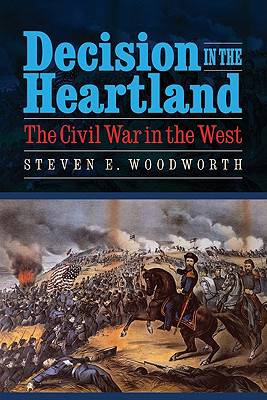
- Afhalen na 1 uur in een winkel met voorraad
- Gratis thuislevering in België vanaf € 30
- Ruim aanbod met 7 miljoen producten
- Afhalen na 1 uur in een winkel met voorraad
- Gratis thuislevering in België vanaf € 30
- Ruim aanbod met 7 miljoen producten
Zoeken
€ 27,95
+ 55 punten
Omschrijving
The verdict is in: the Civil War was won in the West, that is, in the nation's heartland, between the Appalachian Mountains and the Mississippi River. Contrary to much popular literature, serious scholars have determined in one careful study after another the pivotal importance of what was, at the time of the Civil War, the western United States. In this fast-paced overview, Steven E. Woodworth presents his case for the decisiveness of that theater.
Overwhelming evidence now indicates that western campaigns cost the Confederacy vast territories, the manufacturing center of Nashville, the financial center of New Orleans, communications hubs such as Corinth, Chattanooga, and Atlanta, along with the agricultural produce of the breadbasket of the Confederacy. They sapped the morale of Confederates and buoyed the spirits of Unionists, ultimately sealing the Northern electorate's decision to return Lincoln to the presidency for a second term and to see the war through to final victory. Detailing the "western" clashes (Fort Donelson, Shiloh, Chattanooga, and Atlanta) that proved so significant, Woodworth contends that it was there alone that the Civil War could be--and was--decided.
Overwhelming evidence now indicates that western campaigns cost the Confederacy vast territories, the manufacturing center of Nashville, the financial center of New Orleans, communications hubs such as Corinth, Chattanooga, and Atlanta, along with the agricultural produce of the breadbasket of the Confederacy. They sapped the morale of Confederates and buoyed the spirits of Unionists, ultimately sealing the Northern electorate's decision to return Lincoln to the presidency for a second term and to see the war through to final victory. Detailing the "western" clashes (Fort Donelson, Shiloh, Chattanooga, and Atlanta) that proved so significant, Woodworth contends that it was there alone that the Civil War could be--and was--decided.
Specificaties
Betrokkenen
- Auteur(s):
- Uitgeverij:
Inhoud
- Aantal bladzijden:
- 202
- Taal:
- Engels
Eigenschappen
- Productcode (EAN):
- 9780803236264
- Verschijningsdatum:
- 1/07/2011
- Uitvoering:
- Paperback
- Formaat:
- Trade paperback (VS)
- Afmetingen:
- 155 mm x 228 mm
- Gewicht:
- 312 g

Alleen bij Standaard Boekhandel
+ 55 punten op je klantenkaart van Standaard Boekhandel
Beoordelingen
We publiceren alleen reviews die voldoen aan de voorwaarden voor reviews. Bekijk onze voorwaarden voor reviews.








